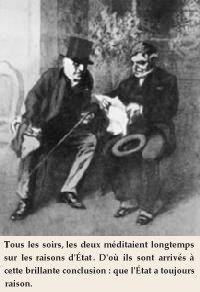claque and click

Chris Locke notes a new edition of one of Flaubert's lesser known works, the Dictionary of Received Ideas, has seen the lite of print. Some of the fascinating Content:
ABSINTHE - Extra-violent poison: one glass and you're dead. Newspapermen drink it as they write their copy. Has killed more soldiers than the Bedouin.
ARCHIMEDES - On hearing his name, shout "Eureka!" Or else: "Give me a fulcrum and I will move the world." There is also Archimedes's screw, but you are not expected to know what it is.
DON QUIXOTE - Don Quixote continually misinterprets the world around him.
FEUDALISM - No need to have one single precise notion about it: thunder against.
OMEGA - Second letter of the Greek alphabet.
SPARTA - To prove their toughness, Spartan boys competed to see how much whipping they could endure.
THIRTEEN - Avoid being thirteen at table; it brings bad luck. The strong-minded should not fail to crack jokes: "What is the difference? I'll eat enough for two!" Or again, if there are ladies, ask if any is pregnant.
Locke detects penance envy:
Here's a hard-headed demographic that ain't takin' no wooden nickels re prayer and spiritual thought, no sir, no way! But who are asking -- evidently in droves demonstrably dense enough (in both senses) that the potential ROI motivated the publication of this book -- "Yeah well... but couldn't we maybe have some like plastic nickels?"Add a dash of absinthe, a dose of exclamatory compulsion, and the USian edition of the immortal pair clicks to life:


1 Comments:
Ok, let's look at some of the depleted meme memno-techne:
MONDAY-HISTORY
Sparta vs. Athens: The Battle for the Ancient World
Sparta, a small city in the rugged mountains of southern Greece, fielded the most feared military in the ancient world. Spartan soldiers, hardened by grueling training that began at birth, never lost a battle in the bloody conflicts that raged almost constantly between the small city-states of ancient Greece. To build this remarkable army, elders in Sparta tested every newborn for weakness and deformities. Babies deemed unlikely to become strong soldiers were tossed into a gorge. For those that passed the test, training was cruel and relentless. The Greek historian and essayist Plutarch wrote that for many of the Spartan soldiers marching to battle was a relief: “For the Spartans, actual war was a holiday compared to their tough training.”
Those babies who passed the test got to become Prime Ministers of Iraq.
It might be a better use of time to read the chapter on Lycurgus.
Post a Comment
<< Home